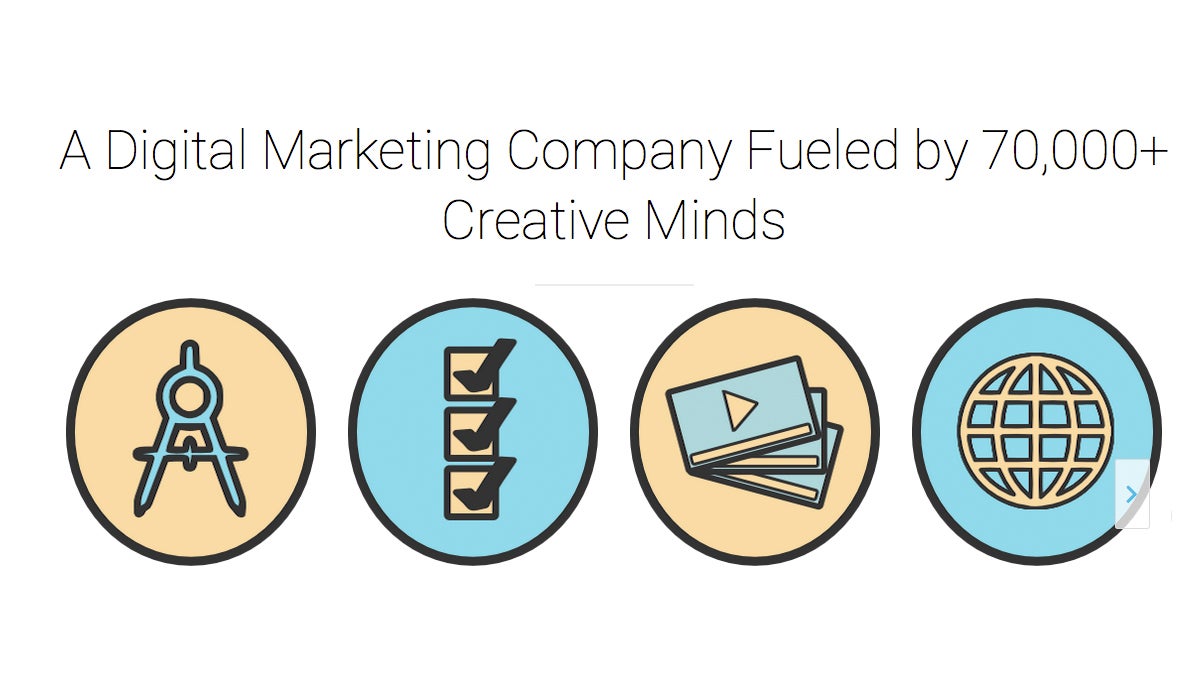Philly video producers chasing maze of companies to get paid

(Image via Poptent.com)
For many up-and-coming filmmakers, partnering with the Philadelphia-based video advertising company Poptent offered an incredible opportunity to get their work noticed.
Freelance videographers working with the 8-year-old tech startup could get their foot in the door by entering their videos into advertising competitions, sometimes winning as much as $10,000.
If they continued to produce successful content, filmmakers could work their way up into more lucrative competitions, creating advertising for bigger brands along the way until eventually Poptent might offer them a contract and a partnership with a major company.
“Poptent was awesome because it was a way to do creative work for big brands,” said Philadelphia native Chris Harley. “It was like independant filmmaking.”
But problems with Poptent began to arise after it merged with a European company called Userfarm last January and became the global company Vizy.
Harley continued producing videos for Vizy through the merger, but the payments started to lag. Money for projects he completed as far back as November didn’t come until April and May of this year.
“I asked when I could expect payment, and was told they were moving a little slower because of the merger,” said Harley.
Two weeks ago, payments ceased completely as the former Poptent abruptly shuttered its Philadelphia location.
“I got notification they were closing their offices and that their employees were being laid off,” said Harley. “I started wondering how am I going to get my money?”
Harley says he’s owed just under $20,000 for his work, and he’s not alone. He’s one of more than 30 filmmakers owed more than $200,000 combined.
“It seems like the only information we can really get out of people is ‘sorry, we still don’t really know what happened,'” said filmmaker Michael James Murray, who said he is owed more than $7,000 for his work with Poptent. “I thought that when two companies merged one assumed all of the debt. It’s like somebody pulling the rug out from underneath you.”
What makes it more complicated is that no one’s really sure who owes them the money.
At the time Poptent merged and became Vizy, venture-capitalist firm MK Capital was one of the principle owners of the company, and Nick Pahade was its CEO. For a brief period, Pahade became the CEO of Vizy but left the office in March. He declined to comment for this story.
When reached for comment, MK Capital partner Mark Koulogeorge said that after the merger he was not kept in the loop, but the firm was a substantial provider of debt capital to Vizy and is now owed a great deal of money as well.
The U.S. website for Vizy is down, and a message on the Userfarm website informs visitors that Userfarm and Vizy are two separate companies, that the “shared use of the Vizy brand did not last long due to the financial issues of Vizy, Inc,” and that it does not share in any of Vizy’s debt responsibility.
When Pahade left the the Vizy CEO position in March, he was replaced by Bruno Pellegrini, former CEO of Userfarm. Pellegrini also serves as director of a London-based company UF-PT Limited, which was established in November of 2014, shortly before the Vizy-Userfarm merger.
Two separate sources said that UF-PT Limited was the parent company involved in buying out Poptent and merging it with Userfarm under the Vizy name.
What’s more, when you search Vizy Europe, you’re brought to a Facebook page that will lead you to Userfarm.
No one from Userfarm or UF-PT Limited, including Pellegrini, returned requests for comment.
Many of the filmmakers say they are running out of options for people to call, as many of their contacts were through the now closed Poptent, and many are concerned that legal fees for hiring an attorney could prove costly.
“It’s very sketchy to me that all of these things are still kind of existing while the Poptent thing kind of died but everybody’s acting like nothing happened, like it’s just been erased in a way,” said Murray.
“The frustrating thing is that Poptent was a company giving videos to brands, and the people that were making the videos were us filmmakers,” added Harley. “We should be the first people to get paid. We were their business.”
WHYY is your source for fact-based, in-depth journalism and information. As a nonprofit organization, we rely on financial support from readers like you. Please give today.




